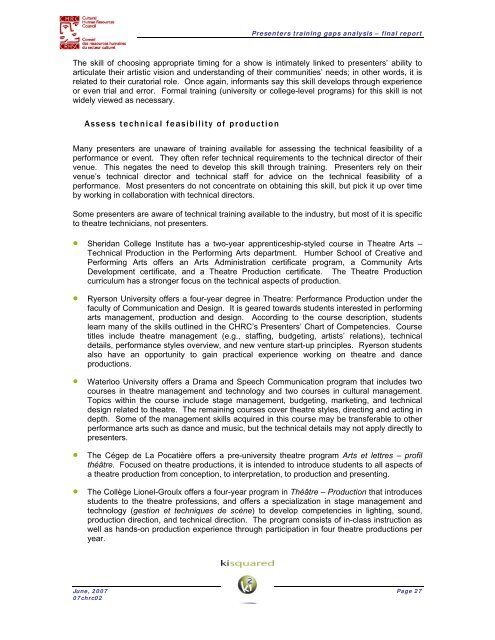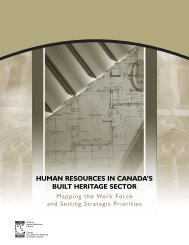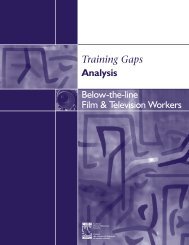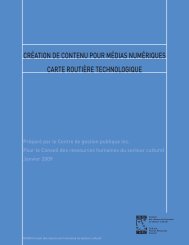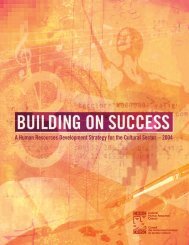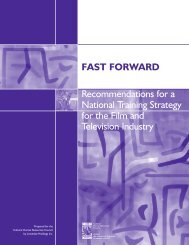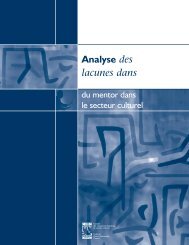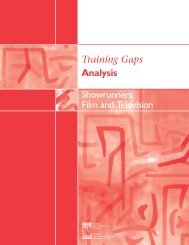Presenters Training Gaps Analysis - Conseil des ressources ...
Presenters Training Gaps Analysis - Conseil des ressources ...
Presenters Training Gaps Analysis - Conseil des ressources ...
Create successful ePaper yourself
Turn your PDF publications into a flip-book with our unique Google optimized e-Paper software.
<strong>Presenters</strong> training gaps analysis – final report<br />
The skill of choosing appropriate timing for a show is intimately linked to presenters’ ability to<br />
articulate their artistic vision and understanding of their communities’ needs; in other words, it is<br />
related to their curatorial role. Once again, informants say this skill develops through experience<br />
or even trial and error. Formal training (university or college-level programs) for this skill is not<br />
widely viewed as necessary.<br />
Assess technical feasibility of production<br />
Many presenters are unaware of training available for assessing the technical feasibility of a<br />
performance or event. They often refer technical requirements to the technical director of their<br />
venue. This negates the need to develop this skill through training. <strong>Presenters</strong> rely on their<br />
venue’s technical director and technical staff for advice on the technical feasibility of a<br />
performance. Most presenters do not concentrate on obtaining this skill, but pick it up over time<br />
by working in collaboration with technical directors.<br />
Some presenters are aware of technical training available to the industry, but most of it is specific<br />
to theatre technicians, not presenters.<br />
• Sheridan College Institute has a two-year apprenticeship-styled course in Theatre Arts –<br />
Technical Production in the Performing Arts department. Humber School of Creative and<br />
Performing Arts offers an Arts Administration certificate program, a Community Arts<br />
Development certificate, and a Theatre Production certificate. The Theatre Production<br />
curriculum has a stronger focus on the technical aspects of production.<br />
• Ryerson University offers a four-year degree in Theatre: Performance Production under the<br />
faculty of Communication and Design. It is geared towards students interested in performing<br />
arts management, production and <strong>des</strong>ign. According to the course <strong>des</strong>cription, students<br />
learn many of the skills outlined in the CHRC’s <strong>Presenters</strong>’ Chart of Competencies. Course<br />
titles include theatre management (e.g., staffing, budgeting, artists’ relations), technical<br />
details, performance styles overview, and new venture start-up principles. Ryerson students<br />
also have an opportunity to gain practical experience working on theatre and dance<br />
productions.<br />
• Waterloo University offers a Drama and Speech Communication program that inclu<strong>des</strong> two<br />
courses in theatre management and technology and two courses in cultural management.<br />
Topics within the course include stage management, budgeting, marketing, and technical<br />
<strong>des</strong>ign related to theatre. The remaining courses cover theatre styles, directing and acting in<br />
depth. Some of the management skills acquired in this course may be transferable to other<br />
performance arts such as dance and music, but the technical details may not apply directly to<br />
presenters.<br />
• The Cégep de La Pocatière offers a pre-university theatre program Arts et lettres – profil<br />
théâtre. Focused on theatre productions, it is intended to introduce students to all aspects of<br />
a theatre production from conception, to interpretation, to production and presenting.<br />
• The Collège Lionel-Groulx offers a four-year program in Théâtre – Production that introduces<br />
students to the theatre professions, and offers a specialization in stage management and<br />
technology (gestion et techniques de scène) to develop competencies in lighting, sound,<br />
production direction, and technical direction. The program consists of in-class instruction as<br />
well as hands-on production experience through participation in four theatre productions per<br />
year.<br />
June, 2007<br />
07chrc02<br />
Page 27


